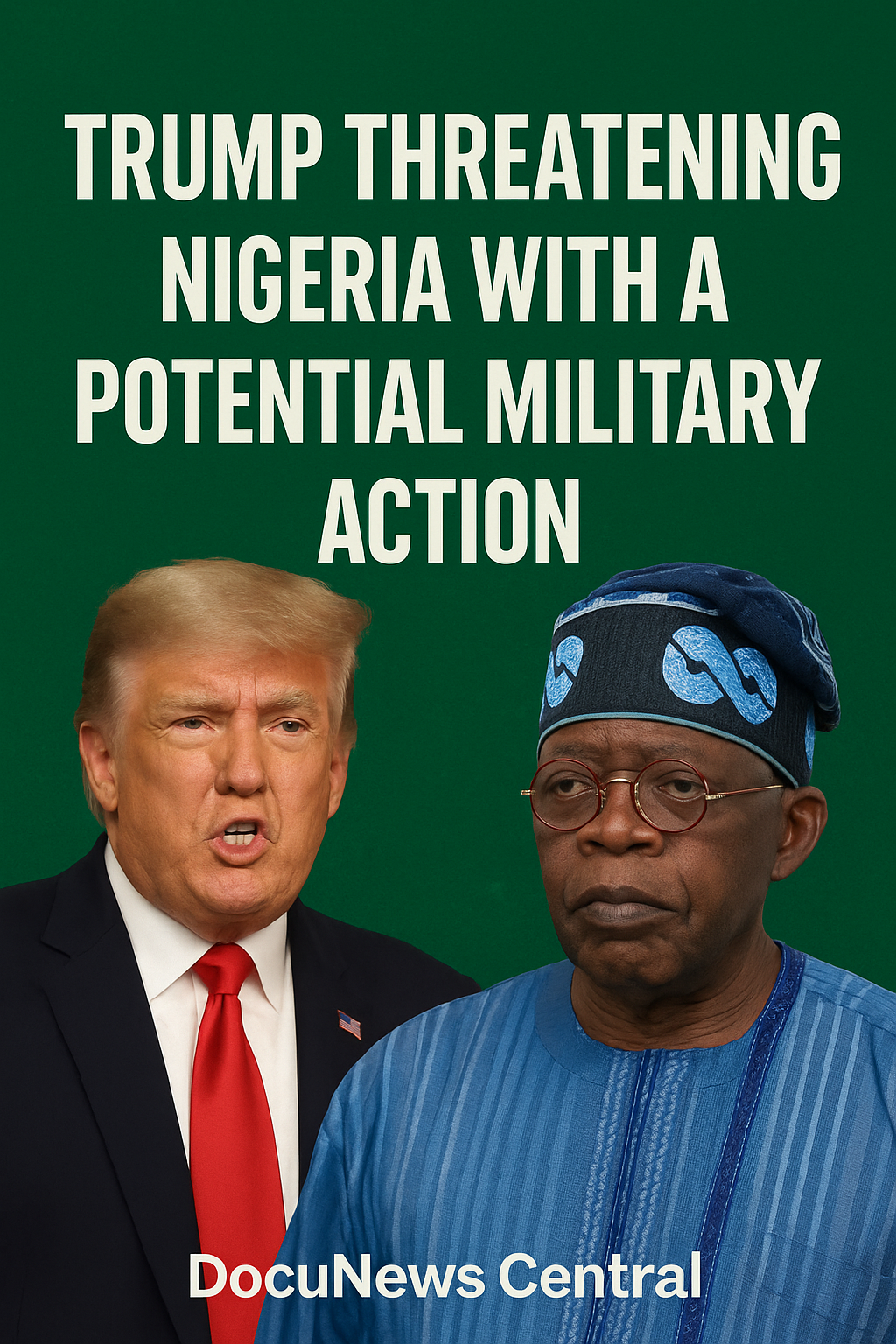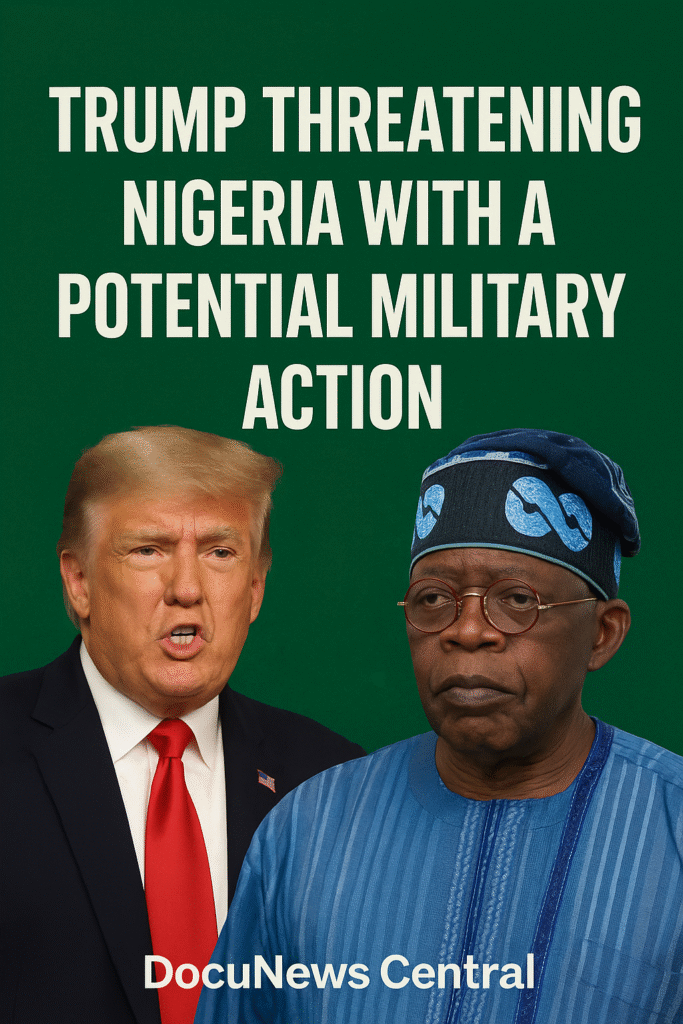
By DocuNews Central — November 2, 2025

Rising Tensions Between Washington and Abuja
In a dramatic turn of international events, United States President Donald J. Trump has threatened Nigeria with military action following claims that the Nigerian government is failing to protect its Christian population. The statement, which went viral on social media, has sparked heated debates across both nations and prompted diplomatic reactions from President Bola Ahmed Tinubu.
President Trump’s remarks were made during a televised address and a series of posts on his Truth Social account, where he alleged that Nigeria has allowed “mass killings of Christians by radical Islamic groups.” He announced that he had directed the Pentagon to “prepare for possible action” if the situation continues unchecked.
Trump’s Explosive Allegation
According to reports from Al Jazeera and NDTV, President Trump’s comments have sent shockwaves through diplomatic circles. He claimed that “thousands of innocent Christians” have been killed in recent years and that the world cannot stay silent while “faith-based persecution spreads.”
“If Nigeria cannot protect its Christian citizens, America will not sit back and watch,” Trump said. “We will act to defend human life and religious liberty — even if it means showing force.”
The phrase “showing force” quickly became a trending topic worldwide, as analysts debated whether the US could actually move troops or enforce sanctions in the region.
Tinubu’s Swift and Firm Response
Nigerian President Bola Ahmed Tinubu wasted no time in responding. In a statement released by the Ministry of Foreign Affairs, Tinubu dismissed Trump’s comments as “baseless and politically motivated.”
“Nigeria remains a secular state that respects freedom of worship. The president rejects the idea that the government is targeting or neglecting any religious group,” the statement read. “We urge our American partners to verify facts before issuing such sensitive statements.”

Tinubu further warned that any form of military aggression against a sovereign African nation would violate international law. He emphasized that Nigeria’s security challenges affect both Christians and Muslims alike, not one faith alone.
Global Reaction: Mixed Feelings Across Africa and Beyond
Trump’s statement has drawn mixed reactions. In Africa, leaders from Ghana, Kenya, and South Africa expressed concern that such rhetoric could inflame religious tensions. The African Union urged both countries to “prioritize diplomacy over confrontation.”
The Christian Association of Nigeria (CAN) welcomed Trump’s concern but cautioned against interference. “We appreciate international attention, but Nigeria must solve its internal problems through peaceful dialogue,” said CAN spokesperson Rev. Samson Ayokunle.
Experts Warn of Diplomatic Fallout
International analysts warn that Trump’s threat could strain the long-standing partnership between Washington and Abuja. Nigeria is one of the US’s key allies in fighting terrorism, particularly against Boko Haram and ISIS-West Africa. A conflict could hinder intelligence sharing and destabilize regional peace efforts.
Dr. James Olayinka, a political analyst at the University of Lagos, noted, “This kind of statement can damage years of cooperation. The US has provided counterterrorism training to Nigerian forces. If tensions escalate, cooperation could be at risk.”
Background: The Alleged Killings of Christians
The issue of religious violence in Nigeria has existed for decades. Several reports document attacks by armed groups on rural communities, but the motives vary. Human rights groups emphasize that both Christians and Muslims have been victims of extremist violence, driven by land disputes, poverty, and terrorism.
Trump’s portrayal simplifies the crisis into a religious narrative, which many critics say is misleading and could worsen divisions.
Potential Consequences of a US “Show of Force”
If the US follows through with Trump’s statement, it could have serious geopolitical consequences. Nigeria is Africa’s largest economy and a major oil producer. Any military action could destabilize the region and impact global energy markets.
Experts believe full-scale intervention is unlikely without congressional oversight. Typically, the US engages in Africa through advisory or logistical missions, not direct conflict.
Trump’s Domestic Motivation
Analysts in the US suggest that Trump’s rhetoric may be aimed at his domestic base. As midterm elections approach, he’s emphasizing Christian persecution and foreign policy strength — issues that resonate with conservative voters.
“By talking tough on religious persecution, Trump strengthens his image as a defender of Christian values,” said US political analyst Dr. Rachel Adams. “It’s as much about politics as it is about policy.”
Nigeria’s Diplomatic Strategy Going Forward
Sources indicate that Nigeria may seek direct talks with Washington to ease tensions. Diplomats are working closely with the US Embassy in Abuja to provide data on religious freedom and counterterrorism operations.
Meanwhile, social media users across Nigeria launched hashtags such as #HandsOffNigeria and #TrumpBackOff, uniting across religious lines. Many insist that while insecurity is real, foreign military intervention is not the answer.
FAQ: Trump’s Threat to Nigeria Explained
1. Did Trump officially order troops to Nigeria?
No. He instructed the Pentagon to “prepare for possible action,” but no confirmed military deployment has occurred.
2. What is President Tinubu’s position?
Tinubu rejected Trump’s allegations, affirming Nigeria’s commitment to religious freedom and peace among all citizens.
3. Why did Trump make this threat?
Trump cited the alleged persecution of Christians as his motivation. Analysts say it also aligns with his domestic political goals.
4. Could this lead to sanctions or conflict?
Experts believe full military confrontation is unlikely. However, diplomatic tension and sanctions are possible if the issue escalates.
Conclusion: Diplomacy or Deterrence?
The standoff between Donald Trump and Bola Tinubu highlights the fragile nature of international relations when religion and politics collide. While Trump’s warning may have been intended as a human rights stance, its aggressive tone risks undoing years of cooperation between both nations.
For now, the world watches closely. Whether the United States chooses diplomacy or deterrence will define the next chapter of this unfolding story — and influence how Africa perceives America’s global role.
Related Posts: Nigerians Demand US Visa Bans for Tinubu, Wike, Akpabio, and Shettima
US-Nigeria Relations: What History Teaches About Political Sanctions
Author: DocuNews Central








